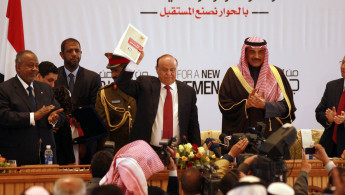Talks about who talks about Yemen
The view of the Yemen's government and its Gulf allies to end the conflict in the country seem removed from stated regional and global intitatives.
A main point of contention is the involvement of Iran in any peace talks.
On Wednesday, Saudi Arabia's ambassador to the UN, Abdullah al-Mouallimi, said that Iran should not be invited to talks in Geneva on 28 May.
What should guide peace iniatives is the earlier Riyadh Declaration, National Dialogue in 2013 and international resolutions, he said. The Qatari delegate, Aliaa al-Thani, appeared to agree with this.
Iranian role
The UN-sponsored meeting in Geneva is set to bring all warring parties together for talks, including the Houthis. The Zaydi-Shia group who overthrew the recognised government of Abd Rabbo Mansour Hadi were absent from the Riyadh talks, although the UN appear to be eager to bring the Houthis into dialogue.
Speaking from Sanaa last week, the UN's new envoy to Yemen, Ismail Ould Cheikh Ahmed, said that Tehran were central to a peace agreement, and today Ahmed will visit Iran to discuss this issue.
Foreign minister Riad Yassin has expressed reservations about the Geneva talks and their timing. He told Reuters that Yemen's exiled government might boycott the Geneva talks because it has not yet been officially notified and wants more time to prepare.
Yassin insisted that Houthi rebels should abide by UN resolution 2216 and disarm before talks begin, and demanded they withdrew from areas under their control.
Later, when speaking to the AFP news agency, he appeared to have lessened his demands.
"We will not attend if there is no implementation [of the resolution], or at least part of it [and] if there is no withdrawal from Aden at least, or Taiz."
Before Ahmed's visit to Iran was announced, Yemen's prime minister Khaled Bahah rejected Iranian involvement and also called on them to withdraw from occupied territory and lay down their weapons.
| Yassin insists that Houthi rebels should abide by UN resolution 2216 and disarm before talks begin. |
Who to invite?
The leaders of the Houthis, Abdel Malik al-Houthi, has said his movement would attend the talks in Geneva.
However, Said al-Washli, a pro-Houthi Yemeni politician based in Germany, said that the Hadi government's insistence that their points are met make the Geneva talks pointless.
However, some believe that the Geneva talks taking place 10 days after Gulf efforts shows the failure of the Riyadh Conference.
According to Yemeni officials in Riyadh a concern of Yemeni and Gulf officials is that the UN overtures allows the Houthis to save face and dig themselves out of a tight hole.
Many also believe that the UN's position towards the crisis in Yemen reflects the position of other world powers, including the US, which is converging with Iranian policy.
Washington fears that a Houthi domination of power would strengthen extremist groups such as al-Qaeda and the Islamic State group in the Sunni heartlands.
The Iranians also appear to understand that it is impossible for the Houthis to rule over the whole of Yemen, when their creed and politics are alien to the majority of Yemenis.
The delegates invited to the Geneva conference appear to be the same as those who were part of the committees tasked with carrying out the agreements of the National Dialogue meeting in Sanaa.
As many as 30 other people might be invited to the talks after a request from Hadi, and this would include representatives from the Southern Movement and the Houthis.
With rival parties agreeing on these points, then there might be some hope that the talks will be fruitful and end the war in Yemen.



